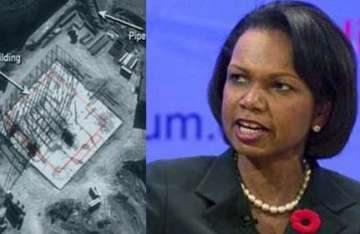India Warned US Of "White Faces" In Pak Terror Camps
Washington, Feb 3 (PTI) Some five months before the 26/11 umbai terrorist attack, India had warned the US about increasing "white faces" in terrorist camps along Pak-Afghan border and the attempt by jihadi groups to

Washington, Feb 3 (PTI) Some five months before the 26/11 umbai terrorist attack, India had warned the US about increasing "white faces" in terrorist camps along Pak-Afghan border and the attempt by jihadi groups to acquire fissile material to "fabricate a crude bomb beyond a dirty bomb".
According to a US diplomatic cable dated May 30, 2008,released by WikiLeaks the then National Security Advisor M K Narayanan had said this during a meeting with the visiting American Senators Russ Feingold and Bob Casey in New Delhi.
According to the cable, Narayanan told the Senators that the US-India relationship amounts to much more than just trade links and defence deals, but rather benefits from a mutual empathy.Asked about terrorism, Narayanan related that training camps on the Pakistan-Afghanistan border have attracted more "white faces".
"He also noted jihadi groups have attempted to acquire fissile material and have the technical competence to manufacture an explosive device beyond a mere dirty bomb," the cable said.
Narayanan lamented that national intelligence agencies lack a common understanding at a time when an incident such as the 2006 blasts in Mumbai involved planning and fundraising in up to 11 different countries, it said.Regarding the May 13 blasts in Jaipur, Narayanan divulged that India has narrowed the suspects to the Harkat-ul-Jihad Islami (HUJI).
According to the cable, Narayanan also observed that the US no longer ignores terrorist attacks that occur in India because it has adopted a more "cooperative angle" to face this common threat.
"He related that Indian intelligence has detected various targets, including southern and northeast Europe,Somalia and the Middle East, but not the US. Non-state actors will intensify their asymmetric warfare, he predicted, and pointed to the increase in 'white recruits' detected by Indian intelligence in terrorist training camps along the Pakistan-Afghanistan borders," the cable said.
"Those recruits will not be used against India or Asian nations," he pointed out, adding that he has warned his counterparts of the development.He also related that India has found a "manifest attempt to get fissile material," though terrorist groups have not yet acquired any.However, he warned, they have "enough physics to fabricate a crude bomb beyond a dirty bomb." the cable said.
Narayanan perceived the lack of "adequate understanding"among intelligence agencies as the greatest weakness in the war on terror."We keep our cards close to our chest, but it is extremely counter-productive," he lamented, recognising that the fault is "equally shared".He cited the 2006 Mumbai blasts, which involved up to 11 countries, and at least seven distinct places where planning occurred.
He noted that he made the pitch during his visit to Washington for greater information sharing, even of bits and pieces, according to the cable."What might not make sense to you might make sense to me," he pressed.
He also observed that jihadis no longer come from just the poorer segment of the Muslim population, but rather from the upper crust of a community that feels threatened in face of Muslim integration in India," the cable said. PTI
According to a US diplomatic cable dated May 30, 2008,released by WikiLeaks the then National Security Advisor M K Narayanan had said this during a meeting with the visiting American Senators Russ Feingold and Bob Casey in New Delhi.
According to the cable, Narayanan told the Senators that the US-India relationship amounts to much more than just trade links and defence deals, but rather benefits from a mutual empathy.Asked about terrorism, Narayanan related that training camps on the Pakistan-Afghanistan border have attracted more "white faces".
"He also noted jihadi groups have attempted to acquire fissile material and have the technical competence to manufacture an explosive device beyond a mere dirty bomb," the cable said.
Narayanan lamented that national intelligence agencies lack a common understanding at a time when an incident such as the 2006 blasts in Mumbai involved planning and fundraising in up to 11 different countries, it said.Regarding the May 13 blasts in Jaipur, Narayanan divulged that India has narrowed the suspects to the Harkat-ul-Jihad Islami (HUJI).
According to the cable, Narayanan also observed that the US no longer ignores terrorist attacks that occur in India because it has adopted a more "cooperative angle" to face this common threat.
"He related that Indian intelligence has detected various targets, including southern and northeast Europe,Somalia and the Middle East, but not the US. Non-state actors will intensify their asymmetric warfare, he predicted, and pointed to the increase in 'white recruits' detected by Indian intelligence in terrorist training camps along the Pakistan-Afghanistan borders," the cable said.
"Those recruits will not be used against India or Asian nations," he pointed out, adding that he has warned his counterparts of the development.He also related that India has found a "manifest attempt to get fissile material," though terrorist groups have not yet acquired any.However, he warned, they have "enough physics to fabricate a crude bomb beyond a dirty bomb." the cable said.
Narayanan perceived the lack of "adequate understanding"among intelligence agencies as the greatest weakness in the war on terror."We keep our cards close to our chest, but it is extremely counter-productive," he lamented, recognising that the fault is "equally shared".He cited the 2006 Mumbai blasts, which involved up to 11 countries, and at least seven distinct places where planning occurred.
He noted that he made the pitch during his visit to Washington for greater information sharing, even of bits and pieces, according to the cable."What might not make sense to you might make sense to me," he pressed.
He also observed that jihadis no longer come from just the poorer segment of the Muslim population, but rather from the upper crust of a community that feels threatened in face of Muslim integration in India," the cable said. PTI